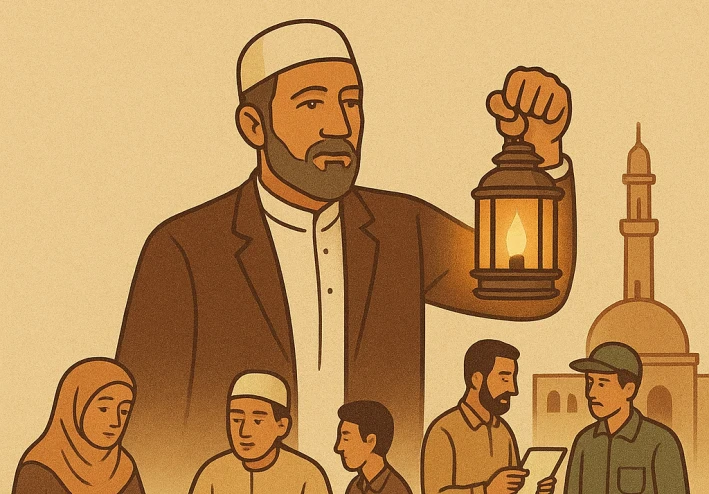
The President’s Lantern
The President’s Lantern: An Islamic Tale of Accountability
President Khalid al-Rahman began his second term with a quiet promise: to govern not for applause but as keeper of a trust — amanah. In a nation where the call to prayer set the rhythm of life and the bazaars still hummed with barter and blessing, he launched a program unlike any audit the country had seen. It was called the Diwan al-Muhasaba — the Presidential Office of Quality Accountability — and its inspections were designed not only to count pennies but to measure the dignity of service, the honesty of intent, and the mercy of administration.
He commissioned teams called the Lanterns of Amanah: small groups of civil servants, imams, engineers, nurses, and ordinary citizens who carried nothing more than lanterns, notebooks, and the right to ask. Their inspections were unique and deliberate. At dawn they would visit a municipal clinic to watch how the tired nurse treated the first patient; at noon they slipped into a school to see whether the promised textbooks were stacked in classrooms or stored in a ledger room; at dusk they would stand silently in the market to observe whether scales were true and promises kept. Each Lantern carried a simple rubric — adl (justice), ihsan (excellence), and maslaha (public good) — and every finding was read aloud in a public forum where questions were welcomed and excuses were recorded.
These inspections introduced novel tools: the Human Ledger, where every citizen could inscribe a short account of service they had received; the Mercy Index, which measured how systems treated the most vulnerable rather than the most visible; and the Niyyah Review — a confidential reflection where servants declared their intention before beginning work, aligning action with conscience. They were exclusive not because they barred people, but because they demanded a new standard of transparency: audits were not secret numbers but living conversations. In mosques and town halls, the President would hear the ledger read and respond not with slogans but with directives forged from listening.
A resistant minister named Faruq thought the Lanterns were a show. He argued that efficiency could be measured with machines and spreadsheets, not with lantern-bearing citizens. The President invited him to join a pre-dawn inspection. Faruq watched a trembling mother receive medicine that had been promised but delayed; he watched a teacher use a single tattered book for a class of fifty and then, quietly, he wrote in the Human Ledger: “I failed to see.” That night the Niyyah Review led Faruq to a private repentance. In the weeks that followed he reallocated funds, supervised deliveries himself, and learned to answer simply when asked in the public forum: “What did you do today to honor the trust?” His report read like a prayer of action.
Quality accountability under President Khalid did not humiliate; it educated. Where inspections uncovered error, the Diwan offered training, reparative budgets, and a public timetable for correction. Where corruption was deliberate, the law took its course; where neglect was borne of fatigue or poor systems, the Lanterns brought compassion and redesign. The most striking innovation was the Year of Shared Work, in which ministers spent one week a year working alongside the public servants they supervised — sweeping, filing, answering phones — to dissolve the distance between vows on paper and life on the ground.
Stories spread: a water pump restored because a child had drawn a map to its broken parts in the Human Ledger; a clinic that began night shifts after a Lantern observed the strain on caregivers; a mayor who resigned after a transparency hearing revealed misdirected funds and later returned as a volunteer rebuilding the same bridge. Everywhere, people began to speak of governance in the vocabulary of faith — duty, service, and humility — and the President spoke often of the Prophet’s counsel to be trustworthy stewards of the people.
When Khalid addressed the nation one Ramadan evening, he did not boast of reforms. He lit a single lantern on the presidential desk and said: “Leadership is a lantern passed among us; it reveals where we stumble and where we can steady one another. Accountability is not punishment but purification.” The Diwan’s inspections remained strict and inventive, but they had become, above all, a shared ritual of care. The moral was simple and old as scripture and new as the dawn: to govern is to be entrusted, and to honor that trust is the truest form of worship.






































